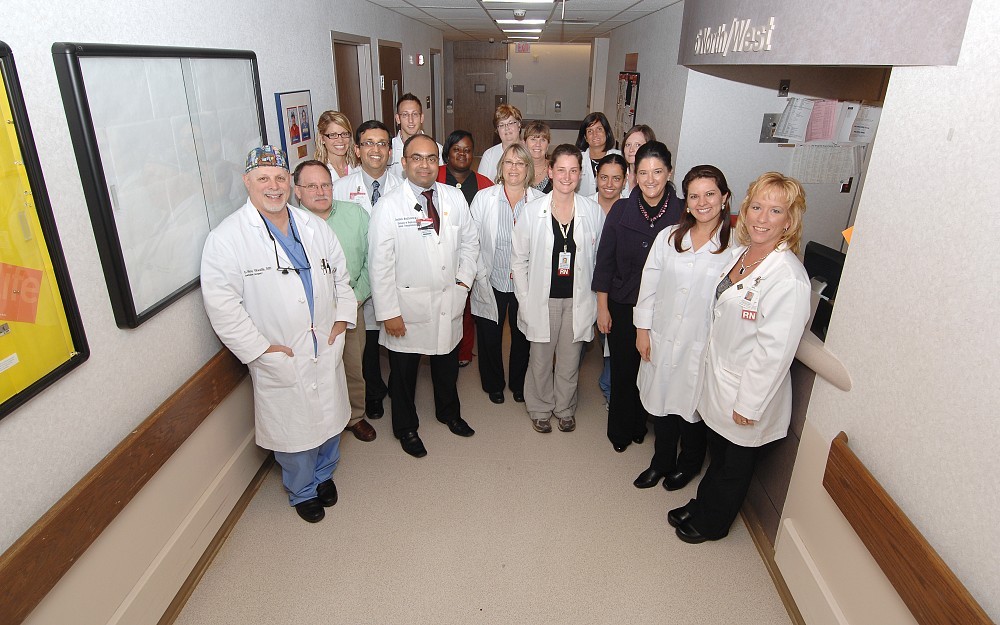
Pharmacist From Largest Kidney Transplant Center in the World Visits UC
A transplant pharmacist with the worlds largest kidney transplant program visited UC last week to learn about the division of transplantations clinical research program.
Claudia Felipe, PharmD, traveled from the Hospital do Rim e Hipertensao in Sao Paulo, Brazil, to speak with UC researchers and clinicians about the role of the clinical pharmacist within UCs kidney transplant program and its clinical trials program.
She was connected to UC through Rita Alloway, PharmD, director of clinical transplant research and research professor of medicinewho had collaborated with Sao Paolo transplant nephrologist Helio Tedesco Silva, MD, on several industry-sponsored trials.
The number of solid organ transplantations in Brazil has more than doubled in the past decadeat the Hospital do Rim e Hipertensao alone, surgeons regularly perform more than 1,000 kidney transplants a year.
Though Felipe recently published on the countrys emerging role in multicenter clinical trials, she said she came to UC to learn more about how the division manages clinical trials and utilizes its pharmacists in patient care and research.
"Everything is very new for us in Brazil, she says. "Our clinical research regulations started in 1996, only 15 years ago, so everything we have done in Brazil, we learned on our own.
At UC, Felipe met with transplant-specific clinical pharmacists, research coordinators, surgeons, nephrologists and CTI, a local clinical research organization which specializes in transplantation. She viewed how the division implements clinical research and renal transplantation simultaneously in the context of a rigorous clinical practice and regulatory guidelines.
After her week-long stay, Felipe said the trip was "amazing.
"Everyone was very lovelyand I learned that our sites work in a different way, she says. "In my hospital, we work in workstations. Each team is an independent team. Here, everybody is involved in all phases of the transplant. Everybody knows about pre-transplant care, post-transplant care and clinical research.
Felipe also studied the role of clinical pharmacists in UCs program. The division employs three faculty-level clinical pharmacists who focus on clinical research and postgraduate training: Tiffany Kaiser, PharmD, a co-investigator and supervisor of liver transplant clinical trials conducted at UC Health University Hospital; Adele Rike Shields, PharmD, a co-investigator and supervisor of kidney transplant clinical trials at Christ Hospital; and Alloway, who also directs UCs Transplant Pharmacy Specialty Residency and Fellowship Program.
In addition, the division typically has two pharmacy postgraduate residents or fellows. The PharmDs serve as investigators and liaison between the transplant team and the clinical research team throughout the transplant process, from the initial consult through the outpatient post-transplant care.
"It is an interesting observation that, despite being miles apart, both transplant programs have evolved similarly in regards to clinical research, says Alloway. "I am honored to potentially collaborate with such a prestigious transplant center, and continue to mentor Dr. Felipe. This relationship is mutually beneficial. I have learned so much from Drs. Felipe and Tedesco Silva as well.

Claudia Felipe, PharmD and Rita Alloway, PharmD
Tags
Related Stories
Ohio could soon make breast cancer screenings more affordable
May 9, 2025
The University of Cincinnati Cancer Center's Ann Brown was featured in Local 12 and Cincinnati Enquirer reports on a bill introduced by Rep. Jean Schmidt in the Ohio legislature that seeks to eliminate out of pocket medical expenses such as copays and deductibles associated with supplemental breast cancer screenings.
UC lab-on-a-chip devices take public health into home
May 8, 2025
University of Cincinnati engineers created a new device to help doctors diagnose depression and anxiety. The “lab-on-a-chip” device measures the stress hormone cortisol from a patient’s saliva. Knowing if a patient has elevated stress hormones can provide useful diagnostic information even if patients do not report feelings of anxiety, stress or depression in a standard mental health questionnaire.
Study explores social media’s growing influence on cosmeceutical...
May 7, 2025
The University of Cincinnati's Kelly Dobos spoke with Cosmetics Design USA about new research that revealed a significant rise in consumer interest in cosmeceuticals, or cosmetic products with active ingredients purported to have medical benefits.
